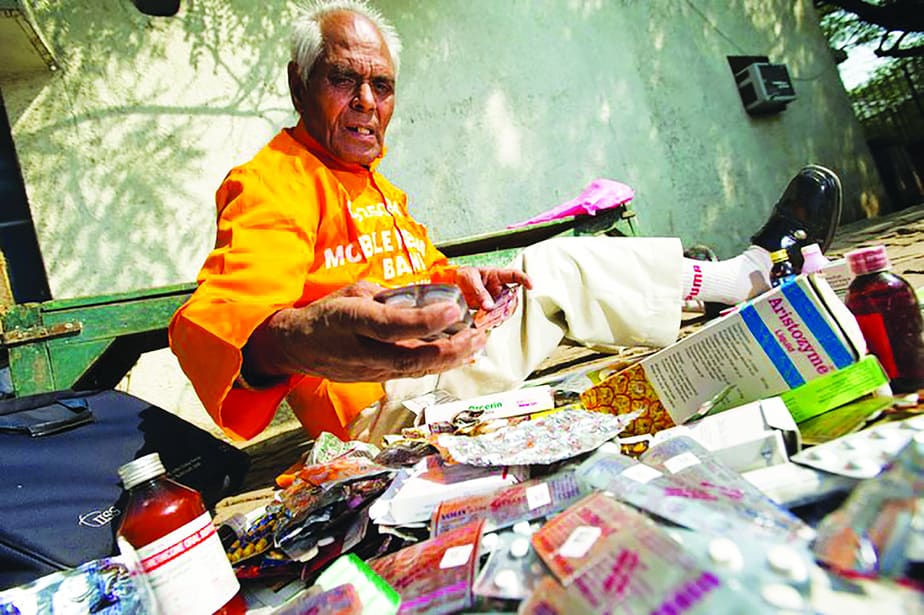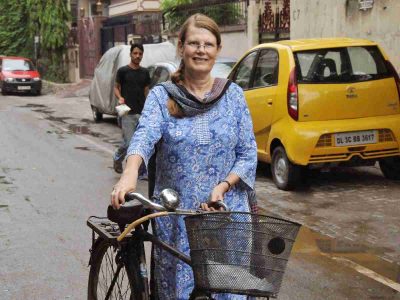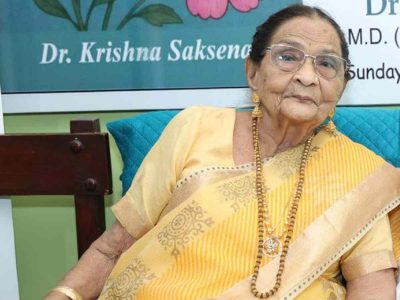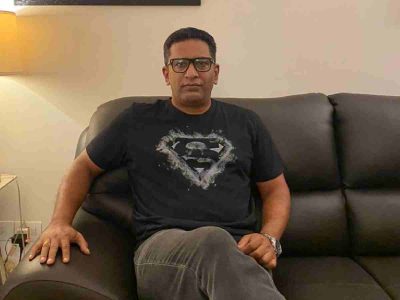For the last 10 years, Omkar Nath Sharma, popularly known as Medicine Baba, has been going door to door collecting unused medicines and donating them to the needy
Every morning, 81-year old Omkar Nath Sharma puts on his orange kurta, takes his bags and goes out for regular strolls. But, he is not like any other man. Popularly known as ‘Medicine Baba’, he goes to different nooks and corners in Delhi-NCR and collects unused medicines from different households to donate it to the poor.
Sharma was born in Udaipur, Rajasthan on July 15, 1936. From childhood, he was always interested in helping others, right from an injured dog to a blind man crossing the street. “I moved to Delhi more than 50 years ago. Ever since, this city has been my home and its people are like my relatives. So I feel a deep connection with it,” he says. He worked as a technician in the blood bank of Kailash Hospital, Noida till his retirement.
An incident changed his life. On October 19, 2008, tragedy struck as the Laxmi Nagar Metro bridge, then under construction, collapsed all of a sudden. The incident sent shockwaves around the city as many people were injured and a few were also killed. Sharma was shaken by this incident, and being the Good Samaritan he is, rushed to the aid of the needy. “I took a lot of people to the nearby hospital, and I noticed that most of the persons injured were either construction workers or street dwellers who lived under the bridge”, says Sharma. He further adds, that there was so much rush in the hospital at that point of time that they had completely run out of medicines. “Whenever the doctor prescribed a medicine, he asked the patient’s family to buy it from some other shop. They were so costly that poor patients could not afford them. Many of them died, or had limbs amputated due to lack of medicines. This incident shook me to the core”, says Sharma.
“This incident made me realise that the downtrodden too need access to medicines, and so many people die due to this problem. I had to find a solution,” he says. “ I thought hard as to how I could solve it, and suddenly an idea hit my mind”, he adds. “We buy medicines every now and then. When we recover, there are always a few tablets that we don’t use. If we do not throw these away and somehow store them, we can create a medicine bank for the poor and needy,” says Sharma.
From that day onwards, he decided that he would walk around different localities of the city and beg for medicines. “Every morning, I go to different localities around Delhi and even Gurgaon and Noida, and walk for at least 10 km collecting medicines from houses,” he says. He shouts “Koi bekaar ki dawaiyan daan karenge jo aap ke kaam mein nahi aa rahi hai? (Is there any leftover medicine that you want to donate?)”, as he goes on door to door. But walking such long distances every day is no piece of cake for Medicine Baba at this age.
When he was a child, Omkar Nath Sharma met with an accident. While he was playing on the road back in Udaipur, a car came at full speed and struck him. As a result of this accident, the femur of his left leg was broken to bits, and when it regrew, the shape became abnormal. So, he is handicapped since childhood, and the doctors had specifically warned him not to walk long distances. “If I stop walking, what will happen to all those people who come to Medicine Baba for their problems?” he says.
Another unique thing about Medicine Baba is his orange kurta. The kurta has his phone number and address printed on it. “I want to be accessible to all people at every time. So, whenever people see my phone number on my kurta, they can take note of it, and call me if they need me”, he says.
Sharma began his journey 10 years ago, all alone, and now he has his own organization and trust with many people dedicated to help him in his cause. “Earlier, all the medicines that I got were from my door to door collections. But now many people call me and donate medicines. I even receive donations from abroad”, says Sharma, who has a whole website dedicated to his name. He even has installed medicine donation boxes in front of temples, from where, he claims, he collects lots of medicines. Sharma even donates his medicines to natural disaster relief funds and NGOs that deal with healthcare for the needy.
Sharma, however does not donate his medicines to anyone and everyone. “To take my medicines one has to come with a doctor’s prescription, and only then will I hand over the medicine”, says Sharma. He even checks the expiry dates of all the medicines before giving it to anyone.
“Earlier, I only collected medicines, but now people donate other medical equipment like hospital beds, nebulizers, oxygen cylinders and even unused sanitary pads”, he says. In case of the sanitary pads however, Sharma and his team conduct proper checks to ensure they are usable.
Sharma, through all his work, has now become quite a famous figure as media houses from across the globe have written about him. “I feel proud when people recognise me and acknowledge my work”, says Sharma who has received a host of awards from different state governments for his contribution to society. “My proudest moment was when the Chhattisgarh government added a chapter on me in the English syllabus of their Class X English textbook. It feels great, when children read about me and I hope I could provide them with some inspiration”, Sharma says gleefully.
According to a report by WHO, around 650 million people don’t have access to the basic medicines in India, the largest in the world. “In a country like ours, where so many people lose their lives due to lack of basic healthcare facilities, I believe, we all should contribute in some way or the other to get rid of this problem”, concludes Medicine Baba.





